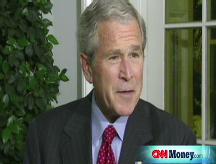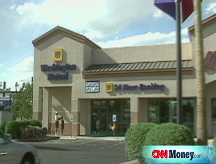Note to Congress: Do something!
The Paulson bailout plan is far from perfect. But experts say it's time for legislators to stop acting like politicians and compromise on a bank rescue.
NEW YORK (CNNMoney.com) -- What now?
Bailout talks have stalled in Congress, raising the real possibility that it will take a lot longer than first expected to approve a rescue for the banking system...if one is approved at all.
The stock market seems to be taking the news in stride, however. As of late morning, the markets were down after Thursday's big gains. But the Dow was only off about 0.5%
And some bank stocks even rallied following Thursday night's stunning failure of Washington Mutual (WM, Fortune 500) and the subsequent sale of its banking assets and branches to JPMorgan Chase (JPM, Fortune 500).
Shares of JPMorgan Chase were up more than 1% Friday and shares of other banks that are perceived to be in reasonably healthy shape, such as Bank of America (BAC, Fortune 500) and Wells Fargo (WFC, Fortune 500) also were trading higher.
So once again, what now? Is the clock really ticking to get some form of bank rescue plan, if not necessarily the $700 billion bailout proposed by Treasury Secretary Henry Paulson, approved by the end of today, or, at the latest, by weekend's end before markets open on Monday?
Will the already tight credit markets completely freeze up?
Probably not -- as long as Congress is signaling that some sort of deal will be done, experts said.
"This is an awful lot of money and there have been a lot of details that haven't been sorted out yet. If politicians continue meeting and indicate there will be a resolution that results in a plan to bring us out of this economic crisis, the markets will give us more time," said David Stowell, a clinical professor of finance at Northwestern University's Kellogg School of Management.
"Details are extremely important. There is a consensus that something needs to be done. It will rock the market if it is not resolved quickly but the market will ultimately survive some uncertainty as long as people are suggesting that they have a will to make something work," Stowell, who previously worked for JPMorgan Chase, Goldman Sachs (GS, Fortune 500) and UBS (UBS), added.
So if we go out on a limb and assume that some sort of bailout package is agreed upon and ultimately passed, what should it look like?
Kevyn Orr, a bankruptcy partner in the Washington, D.C. office of law firm Jones Day and formerly a lawyer with the Department of Justice and the Resolution Trust Corp., the government agency set up in the late 1980s to take over failed savings and loans, said that a bailout has to include more benefits from taxpayers.
He said the hope that spending $700 billion to buy distressed assets will unlock the credit markets and could actually make money for the government down the road.
"There needs to be a direct benefit for taxpayers, something more tangible," said Orr.
Orr added that some limits on executive compensation will probably be needed to try to soothe angry taxpayers who feel the rescue plan is nothing more than a reward for already wealthy Wall Street and banking executives.
And he said that one of the most important aspects of any bailout plan is that there is a bipartisan oversight committee set up to advise and keep watch on the agency put in charge of buying up toxic mortgage assets.
Orr recommended that current FDIC chairman Sheila Bair; former FDIC chair William Seidman, who headed the FDIC during the S&L crisis; Treasury Secretary Nicholas Brady, who served under Presidents Reagan and George H.W. Bush; former Treasury Secretary Robert Rubin, who served under President Clinton; and former Federal Reserve chairman Paul Volcker, who was appointed by President Carter and also served for President Reagan, could serve as members for such a committee.
So is there an urgent need to get the deal done? Yes and no.
Stowell said that even if a bailout is passed, it may not prevent more turmoil in the financial markets in the near-term. To that end, he said that even if a real deal emerged Thursday afternoon, that would not have been enough to keep WaMu from failing, for example.
"The WaMu situation would not have been altered. That die was cast months ago. Unfortunately, it's an organization that was on an inexorable course to be taken over," Stowell said.
Make no mistake. Doing nothing is not an option. Yes, the Paulson plan is far from perfect. And it does appear that proposals about limiting executive compensation and perhaps giving some relief to homeowners facing foreclosure could find their way into a final bill.
But, "if there is no bailout, you will find an ongoing uncertainty about the value of mortgage securities. Banks will be disinclined to provide credit and much more reluctant to lend to companies big and small," Stowell said.
"There would be less expansion and less employment and that obviously creates a scenario of turning a bad economy into a worse economy. If money is not lent and people lose their jobs, that hurts the average guy," Stowell added.
So it's time for Congress to come to some sort of an agreement. It's too late to change the past but it's not too late to come up with a solution that could get us out of this mess.
"There are competing opinions about how to restructure financials," Orr said. "But there already seems to be enough blame going around." ![]()




